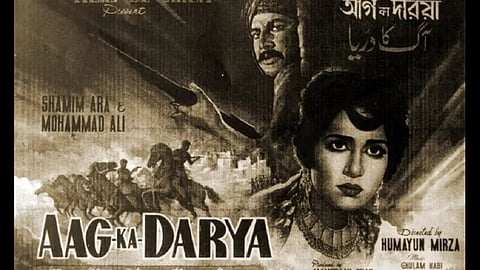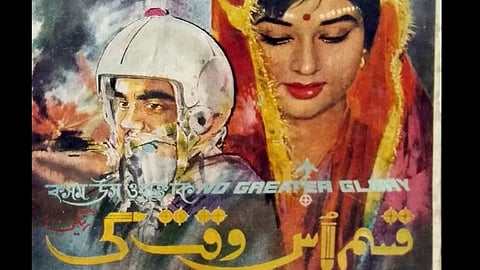February 22 marked the Urdu poet’s 40th death anniversary. Here is a glimpse into a neglected aspect of his oeuvre: the film songs he wrote
‘Pearls Raining From The Air’: Songs Josh Malihabadi Wrote
Urdu poet Josh Malihabadi, who passed away 40 years ago in Islamabad, wrote songs for the famous films like ‘Aag ka Darya’ and 'Qasam Us Vaqt Ki'. He is widely known for penning songs including 'More jabna ka dekho ubhaar', ‘Havaa Se Moti Baras Rahe Hain’ and so on.
"Havaa se moti baras rahe hain, fazaa taraane suna rahi hai
Jagar jagar hai tamam sehra, kali kali jagmagaa rahi hai"
(Pearls are raining from the air
Anthems are being heard in the atmosphere
The whole desert is shining
Every bud is aglitter)
Urdu poet Josh Malihabadi, who passed away 40 years ago in Islamabad on February 22, wrote this song for the famous film ‘Aag ka Darya’ (River of Fire). The film poetry of Josh, known as ‘shaayar-e-inquilab’ (the poet of the revolution), is a chapter of his life to which neither the literary critics paid attention nor Josh himself deemed important.
Josh has written a chapter about his film journey in his famous biography, ‘Yaadon ki Baraat’ (The Procession of Memories, a marvel of embellished anecdote), but one only gathers from studying this chapter that he spent a few years before the creation of Pakistan at Poona in the Shalimar Studios of W. Z. Ahmed and wrote songs for a few films there which included ‘Aik Raat’ (One Night), ‘Ghulami’ (Slavery), ‘Shehzadi’ (Awara) and ‘Prithviraj,’ along with the legendary film ‘Man Ki Jeet’ (Triumph of the Will).
The music of this film had been composed by S. K. Pal. The songs of this film are preserved although one does not get a clue about the songs of the other films. Only a guess can be made that the songs which are included in Josh’s poetic collections ‘Arsh-o-Farsh’ (Heaven and Earth) and ‘Ramish-o-Rang’ (Joy and Colour) are related to these very unknown films.
Seven songs were included in ‘Man ki Jeet’ in which six were written by Josh and one song (‘Chhup Chhup Kar Mat Dekho’) was written by Bharat Vyas. The songs written by Josh are present in the available film story of ‘Man ki Jeet.’ Its mukhdas (choruses) were:
1. Man kaahe ghabraye (Why does the heart agitate)
2. Nagri meri kab tak yoonhi barbaad rahegi (Till when will my city be ruined in this very manner)
3. More jabna ka dekho ubhaar (See the swell of my breasts)
4. Pardesi kyun yaad aata hai (Why do I miss the stranger)
5. Ae chaand tera itraana (O moon your arrogance)
6. Ae chaand umeedon ko meri shama dikha de (O moon show my hopes the way)
Among these songs, ‘More jabna ka dekho ubhaar’ became very popular due to its beautiful poetry, but this is the same song which the government of the day had banned from broadcasting on All India Radio deeming it obscene. A few critics acknowledge this song to be a great literary piece with reference to its theme.
Josh had used extremely fine metaphors in this song; the techniques of ‘gaddar anaar’ (fleshy pomegranate), etc. included in it had become the talk of the town in the entire subcontinent with the release of this film. Its reflection can be found in the famous song of Javed Akhtar, ‘Ek Ladki Ko Dekha Toa Aisa Laga’ (‘1942: A Love Story’).
Another song of ‘Man ki Jeet’, ‘Nagri meri kab tak yoonhi barbaad rahegi/Dunya yahi dunya hai to kya yaad rahegi (Till when will my city be ruined in this very manner/The world will remain the same so why remember?) was sung by the heroine of the film Shahida (Neena). The second line of this song is not Josh Malihabadi’s, but was written by Yas Yagana Changezi.
After the popularity of this song, Yagana protested a lot over this which proved to be a cry in the wilderness. In December 1955, Josh came to Pakistan. Here, many filmmakers insisted upon him to write songs for their films, but Josh kept avoiding them; but when his longtime friend Humayun Mirza solicited him to write songs for his film ‘Aag ka Darya’ he could not reject his demand.

According to the booklet on ‘Aag ka Darya,’ Josh had written eight songs for the film, which entirely seemed set in stone in a ring. Among these songs, the greatest popularity was achieved by ‘Ae Vatan Hum Hain Teri Shama ke Parvaanon Mein’ (O homeland we are among the moths in your flame) and ‘Havaa Se Moti Baras Rahe Hain’ (Pearls are raining from the air).
For this last song (‘Havaa Se Moti Baras Rahe Hain’) he was also awarded the Nigar Award for Best Lyricist. The music of ‘Aag ka Darya’ has been composed by Ghulam Nabi Abdul Latif.

After ‘Aag ka Darya’, the film adorned with a Josh song which graced the silver screen was ‘Qasam Us Vaqt Ki’ (By That Time). The music for this film was composed by Suhail Rana and the song of Josh which became the title song for this film; its first line was ‘Qasam us vaqt ki jab zindagi karvat badalti hai’ (By that time when life changes its condition).
The interesting thing is that this chorus of Josh’s song was included in his poem Paimaan-e-Mohkam (Firm Promise). This poem is the first poem in the poetic collection of Josh published in 1936 ‘Shola-o-Shabnam’ (Flame and Dew) and the first couplet of this poem is:
"Qasam us vaqt ki jab zindagi karvat badalti hai
Qasam us saans ki jo maut ke hungaam chalti hai"
(By that time when life changes its condition
By that breath which comes and goes in death’s season)
‘Qasam Us Vaqt Ki’ was shown in 1969. The next year filmmaker Ghulam Nasir Khan and director Shor Lakhnavi’s ‘Chand Sooraj’ (The Moon and the Sun), too, included a song of Josh. The musician of this film was Nashad and the song of Josh which was part of the film had the chorus:
"Nazar mila kar chale gaye hain magar tasavvur mein aa rahe hain
Meri nigaahon se hat gaye hain magar umangon pe chhaa rahe hain"
(They have departed after our eyes met but are coming into the imagination
They are out of my sight, but overpowering our ambition)
‘Chand Sooraj’ was the last film shown in Josh’s life with him as a film lyricist.
But the film ‘Azad’ (Independent) released in 2008 also included a famous poem of Josh, ‘Bol Iktara’ (Speak Iktara) as a film song. This poem of Josh is included in his poetic collection, ‘Ilhaam-o-Afkaar’ (Revelation and Ideas) published in 1966. According to Dr Hilal Naqvi, poet and an expert among modern elegy writers, it greatly aids in understanding the reflective style of Josh’s poetic journey.
This poem has also been sung by famous singer Jagjit Singh, but for ‘Azad’ its music was arranged by Abbas Ali Khan. Natasha Humera Ejaz lent it her voice.
Josh did not give any importance to his film poetry. In an interview given to film lyricist and journalist Younus Hamdam in 1966, he said: “Actually I myself did not want to continue the arrangement of writing songs for films because people who create pure literature have to come from superiority to inferiority and during this journey, they face difficulty in maintaining their standard because the majority of film viewers generally possesses a lower-level mentality and the success of the film depends very much on its preference.”
In the same interview, Josh also stated that he never composed any song keeping the music in mind. He always wrote them according to the situation of the film, leaving it to the directors and musicians of those films to transform his songs in the mould of music.
(Raza Naeem is a Pakistani social scientist, book critic and award-winning translator and dramatic reader based in Lahore, where he is also the president of the Progressive Writers Association. All the translations from the Urdu are by the writer.)